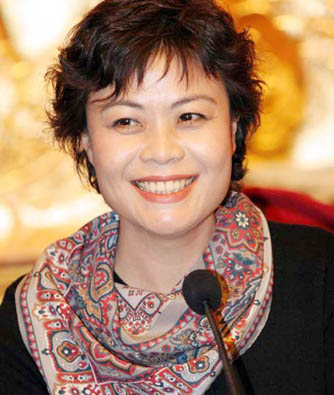| Tools: Save | Print | E-mail | Most Read |
| Tie Ning's Rise To Glory Sparks Debate |
| Adjust font size: |
Chinese writers seldom become the talk of town, however the election of the new president for the Chinese Writers Association has made a big stir.
Tie Ning, 49, became the first woman and youngest president elected in the association's 57 years of history, when the seventh congress of the association convened in While the association's congress concluded yesterday, the excitement about the new leader fuelled heated discussion about current Chinese literary circles and the possibility of a new era. "The choice of such a relatively young leader indicates a tangible step in transforming the ageing writers association in a new era," Yang Honghai, a veteran writer based in Shenzhen, commented upon Tie's election. "For quite some time, the president has been a symbolic title for big names," Shanghai-based biographical writer Ye Yonglie told local media. "Now we expect a new leader who could bring vivacity and freshness into the organization and help Chinese writers in a down-to-earth fashion." Serious author In the Internet age, when new names and titles mushroom daily, Tie Ning may not be However, many critics agree she has a huge following from both average readers and people from the Chinese literary communities. Her early novels Ah, Xiangxue and Red Shirt Without Button have been made into prize-winning films in the 1980s; many of her latest novels have been turned into well-received TV drama series over the past decade, and her literary works enjoy a vast readership in many countries and regions. In 2003, Tie was voted by the readers of Selected Novels magazine as one of the "Top Ten Popular Chinese Writers of the New Century." Over the past two decades, she has acted as the head of the Hebei Provincial Writers Association and vice-chair of the Chinese Writers Association, which she now leads. She has impressed many people with her down-to-earth attitude and assistance to many local authors. "Despite her tight schedule, she is always able to find time to ink out one good novel after another," said Yang Jianping with the Hebei Provincial Writers Association. Born in Foreign novels, such as Jean-Christophe by French writer Romain Rolland (1866-1944), greatly influenced her outlook on the world and its peoples. She began writing short stories in junior high school and after graduating in 1975, she traveled to rural areas to better understand Chinese farmers. The same year, her maiden work The Flying Scythe was published by the Beijing Publishing House. Greatly encouraged, Tie continued writing short stories whilst working in a mountainous village in western "Looking back at my rural years, I feel that I am really grateful to life. Those years of hard work in the fields and making friends with local farmers have enabled me an insight into the spiritual realm of Chinese people," she once said. In 1979, Tie was recruited as guest literature editor for the Mountain Flowers magazine based in Southwest China's Her early works such as "Xiangxue" and "Red Shirt" provide an exquisite portrayal of the daily dreams, pursuits, contradictions and sufferings in ordinary people's lives. Focusing on farmers The writer cherishes a deep love for rural Chinese and rural life. In some of her works, readers get a clear picture of the miserable experiences of ordinary but very typical Chinese women. In others books she paints a panoramic picture of rural Chinese in a rapidly changing society. In 1986 and 1988, she published two novellas Wheat Straw Stack and Cotton Stack respectively, both reflecting ancient history and culture, and concerning the role of women. In the mid-1980s, she shifted towards reflection on traditional Chinese cultures. In her first full-length novel Rose Door published in 1988, Tie discarded her harmonious and ideal poetic style, to reveal the dark side of human life through the competition for existence among women in several generations. Most of Tie's writings highlight the collective fate of women but in Ben Hua Village, her fourth novel, she created more than 90 convincing characters, mostly male. Tie said she was trying to "use a family history as a footnote for the bigger history of Asked why her writing focused on rural Tie believes the ultimate goal of literature is not to express merely personal woes and joys but to put a finger on the pulse of current times through the experiences of individuals. "For me, writing is kind of a mission. I have no choice but keep writing. Only in doing so do I find satisfaction, sense of fulfillment, and endless joy and inner peace. The novels are the gifts I offer to my readers," Tie once claimed. "Like a farmer who bows deep down and labors in the land, I would bow deep down to life, absorbing nutrition for my soul. I would always be honest to the time in my life, to my pen, to my soul and to my beloved readers." ( |
| Tools: Save | Print | E-mail | Most Read |
 |
| Related Stories |
|
|
Product Directory China Search |
Country Search Hot Buys |
